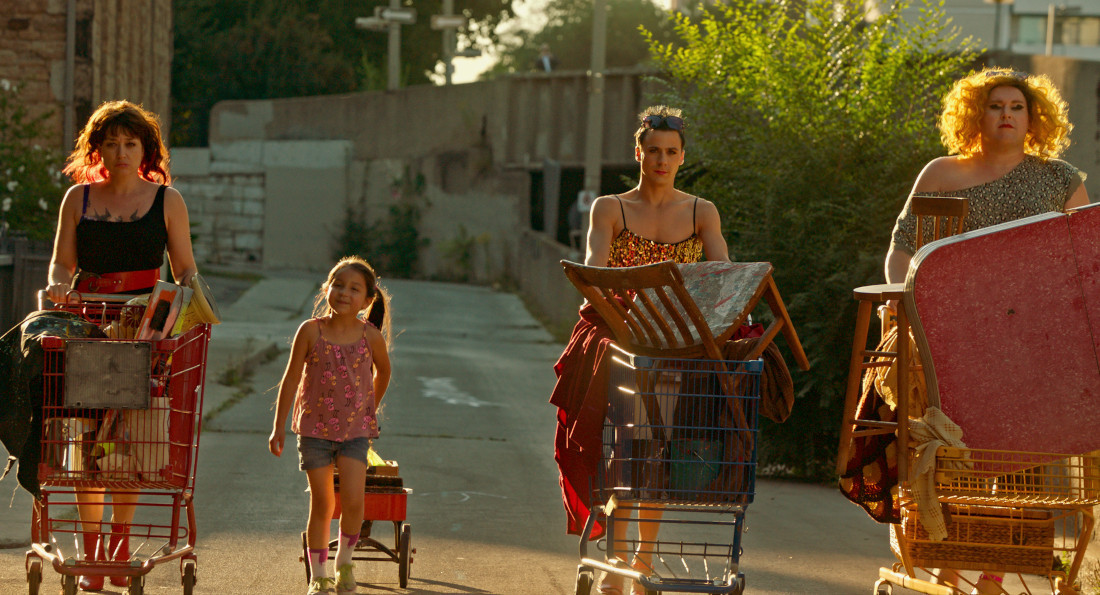Critipeg: Rosie
★★★ out of 5
Plays at Cinematheque from Nov. 11 to 13.
From the Canadian cinematic hotbed that is the Toronto International Film Festival comes Rosie, written and directed by Métis filmmaker Gail Maurice.
The film centres around the story of Rosie, a six-year-old Indigenous girl who has been recently orphaned, and her saga under the care of the reluctant, destitute and hilariously underequipped starving artist Fred(erique), her aunt.
This is a film archetype presented countless times before in various molds, from Adam Sandler’s Big Daddy to more contemporary independent fare like Mike Mills’ C’mon, C’mon. Rosie doesn’t hold many surprises on that front.
Rosie benefits predominately from a deft directorial hand courtesy of Maurice. The movie is set in 1980s Montreal with the backdrop of the Sixties Scoop, a change in child-welfare laws that separated countless Indigenous children from their families.
Neon graffitied alleys and a general laissez-faire attitude toward Fred’s friends, Two-Spirit escorts named Flo (Constant Bernard) and Mo (Alex Trahan), give the impression of a Montreal that never really existed but remains convincing enough, nonetheless. Lots of close-up shots and choosiness with derelict locales ensure its legitimacy as a period piece.
Like a peppy synth-pop tune, even the most dour of moments in this tragicomedy are given levity through its jovial perspective. Fred and Rosie’s journey of acceptance and family isn’t lacking in pathos, but Maurice revels in the humorous juxtaposition of their worlds.
The first encounter between the characters takes place in an adult entertainment shop, adorned with prurient paraphernalia and various smoking apparatuses, while supervised by a child-services worker.
This is ultimately what many describe as a feel-good picture, and in that way the film can be lacking in novel thrill. What does this picture say about history or familial relations that hasn’t been said already? Not much, but it seems beside the point.
At times, the script feels thin. The picture was expanded from a prior short film Maurice produced, and it shows in its 90-minute runtime that somehow feels protracted.
It’s not short of whip-smart repartee from the main characters and some clever callbacks, but the same ebb and flow throughout the relatively uneventful picture begins to stagnate toward the start of the third act. This resolutely character-focused comedy-drama gives plenty of time for its small but skillful cast to comfortably express their anxieties and, more importantly, their small victories.
Given the predictability, it’s the interstitial elements that will keep it afloat, and Rosie has just enough. The soundtrack crackles with verve, with an eclectic mix of lesser-known French, Roland-driven hits, acoustic ballads and some perennial ’80s classics.
A funeral scene scored by Trooper’s “Raise a Little Hell” is cheesy but demonstrates Maurice’s nimble ability to balance tone. It’s inevitable for a film as sentimental as this to flirt with saccharinity, and a less-than-compelling B-plot follows Mo’s struggles with RuPaulian ambitions and stage fright.
Ultimately, this bilingual bildungsroman is most succinctly described as a breeze. It’s not quite a challenging work, but there’s a bit more here than its veneer of a cloying story of misfits drawn together. This is a film about love, family, identity and self-acceptance, enamored with its own simplicity. Who am I to put any of that down?
Published in Volume 77, Number 08 of The Uniter (November 3, 2022)








